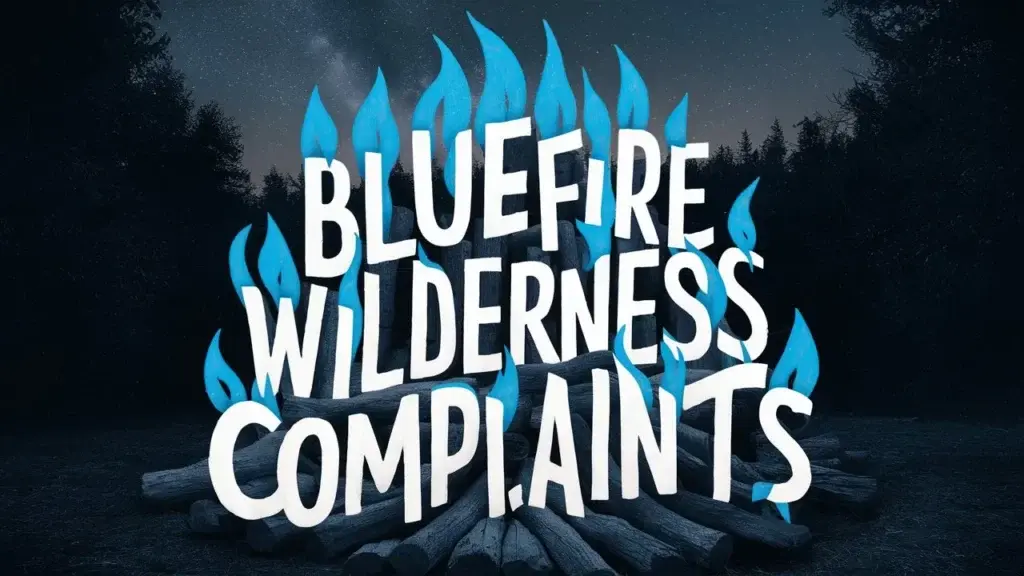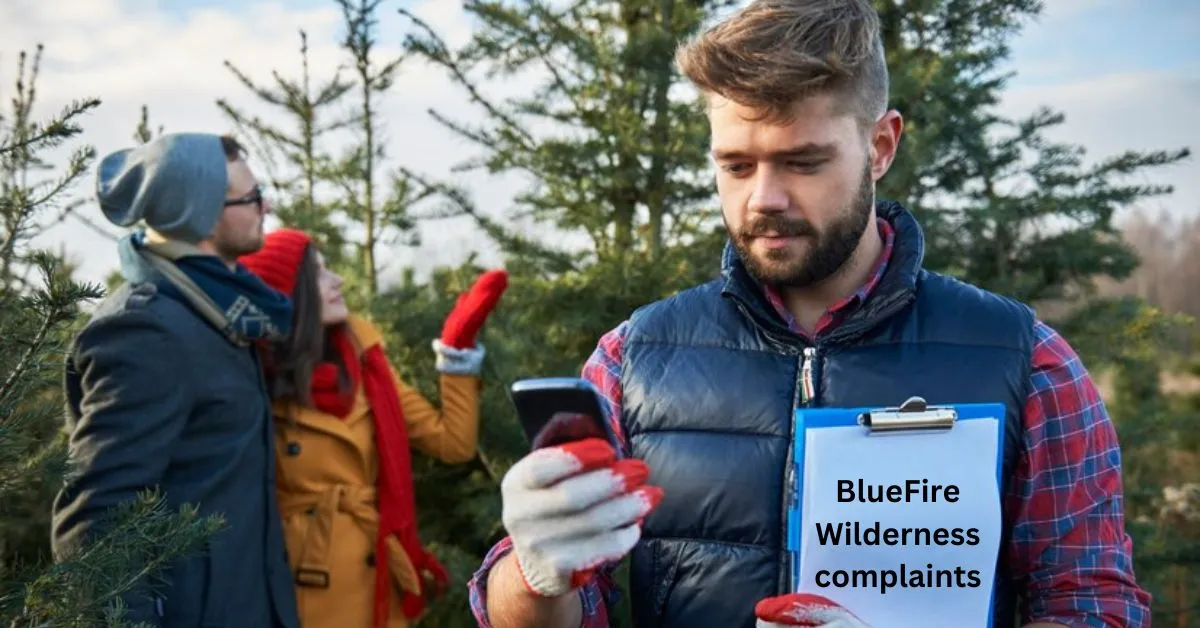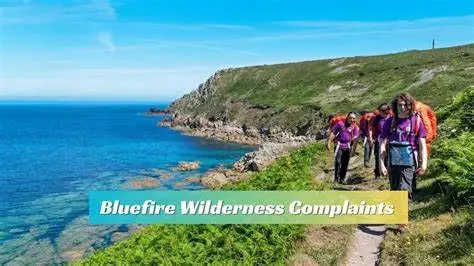Bluefire Wilderness Complaints Therapy is a well-known program that offers therapeutic wilderness experiences for adolescents and young adults. This therapy program aims to help participants overcome various psychological and behavioral challenges by immersing them in nature and engaging them in therapeutic activities. While Bluefire Wilderness “Bluefire Wilderness Complaints” has helped many individuals, it has also faced complaints and criticisms over the years. This article provides a comprehensive exploration of these complaints, examining their origins, the nature of the criticisms, responses from the organization, and the broader implications for wilderness therapy programs.
Background of Bluefire Wilderness Therapy
Overview of the Program
Bluefire Wilderness Therapy “Bluefire Wilderness Complaints” is designed to assist young individuals struggling with issues such as anxiety, depression, substance abuse, and behavioral problems. The program uses a combination of outdoor activities, therapeutic interventions, and group work to help participants develop coping skills, build self-esteem, and improve their overall mental health. Activities include hiking, camping, and survival skills training, all aimed at fostering personal growth and resilience.
Founding and Mission
Bluefire Wilderness “Bluefire Wilderness Complaints” was founded by experienced professionals in the field of therapeutic wilderness programs. The mission of the organization is to provide a safe and supportive environment where participants can confront their challenges, learn new skills, and achieve personal growth. The program emphasizes the importance of nature as a therapeutic tool and seeks to create transformative experiences for its participants.
Common Complaints and Criticisms
Allegations of Inadequate Care
One of the primary complaints against Bluefire Wilderness “Bluefire Wilderness Complaints” involves allegations of inadequate care. Some former participants and their families have reported that the program failed to provide the necessary support and attention needed to address serious mental health issues. These complaints often cite instances where participants felt neglected or unsupported by the staff.
Concerns About Safety and Supervision
Safety and supervision are critical aspects of any wilderness therapy program. However, “Bluefire Wilderness Complaints” Bluefire Wilderness has faced criticisms regarding the safety protocols and level of supervision provided to participants. Complaints in this area include reports of inadequate staff-to-participant ratios, insufficient training for staff members, and incidents where participants were placed in potentially dangerous situations.
Accusations of Harsh or Unethical Treatment
Another significant area of concern involves accusations of harsh or unethical treatment. Some former participants and their families have alleged that the program employs overly strict or punitive measures that can be detrimental to the participants’ mental and emotional well-being. These accusations often highlight instances of harsh discipline, isolation, and emotional distress.
Transparency and Communication Issues
Effective communication and transparency are vital for building trust between the program, participants, and their families. However, Bluefire Wilderness “Bluefire Wilderness Complaints” has been criticized for lacking transparency and adequate communication. Complaints in this area often involve families feeling left in the dark about their child’s progress, program details, and the overall therapeutic approach.
Detailed Examination of Specific Complaints
Case Studies of Inadequate Care
Several case studies illustrate the complaints of inadequate care at Bluefire Wilderness “Bluefire Wilderness Complaints” . For instance, in one case, a participant with severe anxiety reported feeling isolated and unsupported by the staff. Despite expressing their struggles, they felt their concerns were not adequately addressed, leading to a deterioration in their mental health.
Reports of Safety Incidents
There have been multiple reports of safety incidents at Bluefire Wilderness “Bluefire Wilderness Complaints” . One such incident involved a participant who suffered a significant injury during a hiking expedition. The participant’s family claimed that the staff’s response was delayed and inadequate, raising serious concerns about the program’s safety protocols.
Accounts of Harsh Treatment
Accounts of harsh treatment have been shared by former participants who described feeling emotionally distressed due to the program’s disciplinary measures. In one case, a participant reported being isolated from the group for an extended period as a form of punishment, which exacerbated their feelings of loneliness and anxiety.
Issues with Transparency and Communication
Families have voiced frustrations over the lack of transparency and communication from Bluefire Wilderness “Bluefire Wilderness Complaints” . One family reported that they were not informed about significant changes to their child’s treatment plan and felt excluded from important decisions. This lack of communication led to mistrust and dissatisfaction with the program.
Responses from Bluefire Wilderness

Official Statements and Rebuttals
In response to the complaints, Bluefire Wilderness “Bluefire Wilderness Complaints” has issued several official statements addressing the concerns. The organization has consistently emphasized its commitment to providing a safe and supportive environment for participants. They have also highlighted their adherence to industry standards and the qualifications of their staff.
Changes and Improvements Implemented
In light of the criticisms, Bluefire Wilderness “Bluefire Wilderness Complaints” has implemented several changes and improvements. These include increasing staff training, enhancing safety protocols, and improving communication channels with families. The program has also sought to increase transparency by providing more detailed information about their therapeutic approach and progress tracking.
Third-Party Reviews and Audits
To address concerns and improve their services, Bluefire Wilderness “Bluefire Wilderness Complaints” has undergone third-party reviews and audits. These external evaluations aim to assess the program’s compliance with industry standards and identify areas for improvement. The results of these audits are often shared publicly to demonstrate the program’s commitment to accountability and continuous improvement.
Broader Context of Wilderness Therapy Programs
History and Development of Wilderness Therapy
Wilderness therapy has a long history dating back to the mid-20th century. Originally developed as an alternative treatment for troubled youth, these programs have evolved to incorporate evidence-based therapeutic practices and a focus on holistic well-being. The premise is that nature and adventure activities can provide unique therapeutic benefits that traditional therapy settings may not offer.
Benefits and Effectiveness
Research has shown that wilderness therapy can be effective in addressing a range of mental health and behavioral issues. Benefits often cited include improved self-esteem, enhanced coping skills, and better interpersonal relationships. The immersive nature of these programs, combined with the therapeutic interventions, creates a powerful environment for personal growth and healing.
Challenges and Criticisms
Despite its benefits, wilderness therapy is not without challenges and criticisms. Safety concerns, the potential for harsh treatment, and varying levels of program quality are common issues. Additionally, the lack of standardized regulations and oversight can lead to inconsistencies in the delivery of care and support.
Industry Standards and Best Practices
Accreditation and Certification
Accreditation and certification are critical for ensuring the quality and safety of wilderness therapy programs. Organizations such as the Outdoor Behavioral Healthcare Council (OBH Council) and the Association for Experiential Education (AEE) provide accreditation and certification for programs that meet specific standards. These standards cover areas such as safety protocols, staff qualifications, and therapeutic practices.
Staff Training and Qualifications
The qualifications and training of staff members are essential components of a successful wilderness therapy program. Best practices include hiring licensed therapists, providing extensive training in wilderness safety and therapeutic techniques, and ensuring ongoing professional development. Staff members should be equipped to handle a range of mental health issues and emergencies.
Safety Protocols and Risk Management
Effective safety protocols and risk management strategies are crucial for protecting participants in wilderness therapy programs. These protocols should include comprehensive risk assessments, emergency response plans, and clear guidelines for staff and participants. Regular reviews and updates to safety protocols are necessary to address emerging risks and ensure the highest standards of care.
Legal and Ethical Considerations

Regulatory Landscape
The regulatory landscape for wilderness therapy programs varies by region and can be complex. In some areas, these programs are subject to state or federal regulations that govern their operations, while in others, there may be minimal oversight. Understanding the regulatory requirements and ensuring compliance is essential for maintaining the legitimacy and safety of the program.
Ethical Practices and Participant Rights
Ethical practices and respect for participant rights are fundamental principles in wilderness therapy. Programs must ensure informed consent, respect for participant autonomy, and the confidentiality of personal information. Additionally, ethical considerations include providing appropriate care, avoiding harm, and addressing complaints and grievances promptly and effectively.
Legal Implications of Complaints
Complaints against wilderness therapy programs can have significant legal implications. Allegations of inadequate care, safety violations, or harsh treatment can lead to lawsuits, regulatory investigations, and damage to the program’s reputation. It is essential for programs to address complaints transparently and take corrective actions to mitigate legal risks.
The Role of Parents and Guardians
Choosing a Wilderness Therapy Program
Parents and guardians play a crucial role in choosing an appropriate wilderness therapy program for their child. Key considerations include researching the program’s accreditation, understanding the therapeutic approach, and assessing the qualifications of the staff. Visiting the program site, speaking with former participants and their families, and reviewing third-party evaluations can also provide valuable insights.
Involvement and Communication
Active involvement and communication between parents, guardians, and the program are essential for the success of wilderness therapy. Parents should maintain regular contact with the program, participate in family therapy sessions if offered, and stay informed about their child’s progress. Effective communication can help build trust and ensure that any concerns are addressed promptly.
Supporting the Transition Post-Therapy
The transition period after completing a wilderness therapy program is critical for sustained success. Parents and guardians should work closely with the program to develop a post-therapy plan that includes ongoing support, follow-up therapy, and strategies for reintegration into daily life. Providing a supportive and understanding environment at home can help reinforce the progress made during the program.
Voices from Participants and Families
Success Stories
Many participants and their families have shared success stories about their experiences with Bluefire Wilderness “Bluefire Wilderness Complaints” Therapy. These accounts often highlight significant personal growth, improved mental health, and strengthened family relationships. Success stories serve as a testament to the potential benefits of wilderness therapy when conducted effectively.
Testimonials and Reviews
Testimonials and reviews from former participants and their families provide valuable insights into the program’s strengths and areas for improvement. Positive reviews often mention the supportive staff, transformative experiences, and lasting impact of the therapy. Constructive feedback can help the program identify areas for enhancement and ensure continuous improvement.
Addressing Negative Experiences
It is essential to acknowledge and address negative experiences shared by participants and their families. Providing a platform for open dialogue, offering support for those who feel dissatisfied, and taking corrective actions can help rebuild trust and demonstrate the program’s commitment to participant well-being.
Recommendations for Improvement
Enhancing Safety and Supervision
Improving safety and supervision is a critical area for wilderness therapy programs. Recommendations include increasing staff-to-participant ratios, providing comprehensive training for staff, and implementing robust safety protocols. Regular safety audits and feedback from participants can help identify and address potential risks.
Strengthening Therapeutic Support
Enhancing the therapeutic support provided to participants is essential for achieving positive outcomes. Recommendations include employing licensed therapists with experience in wilderness therapy, offering individualized treatment plans, and providing ongoing training for staff in evidence-based therapeutic practices “Bluefire Wilderness Complaints” .
Improving Transparency and Communication
Increasing transparency and improving communication with participants and their families can build trust and satisfaction. Recommendations include providing clear and detailed information about the program, maintaining regular communication about progress and challenges, and involving families in the therapeutic process.
Future Directions for Wilderness Therapy

Emerging Trends and Innovations
The field of wilderness therapy continues to evolve, with emerging trends and innovations shaping the future of the industry. These include incorporating technology to enhance therapeutic interventions, developing specialized programs for specific populations, and integrating evidence-based practices to improve outcomes.
Research and Evidence-Based Practices
Ongoing research is essential for validating the effectiveness of wilderness therapy and identifying best practices. Continued investment in research can help build a stronger evidence base, inform program development, and demonstrate the value of wilderness therapy to stakeholders.
Advocacy and Policy Development
Advocacy and policy development play a crucial role in shaping the future of wilderness therapy. Efforts to raise awareness, secure funding, and develop standardized regulations can help ensure the safety and effectiveness of these programs. Collaborating with policymakers, industry organizations, and advocacy groups can drive positive change and support the growth of the field.
Conclusion
“Bluefire Wilderness Complaints” Therapy has faced a range of complaints and criticisms over the years, highlighting areas for improvement and the challenges inherent in wilderness therapy programs. However, it is also clear that these programs “Bluefire Wilderness Complaints” have the potential to offer significant benefits to participants when conducted effectively and ethically.
By addressing the concerns raised, implementing best practices, and continuing to evolve, wilderness therapy programs like Bluefire Wilderness “Bluefire Wilderness Complaints” can enhance their impact and provide valuable support to those in need. As the field continues to grow and develop, ongoing commitment to safety, transparency, and participant well-being will be essential for building trust and achieving positive outcomes.
Frequently Asked Question FAQs about “Bluefire Wilderness Complaints”
Q1: What is Bluefire Wilderness?
A1: Bluefire Wilderness “Bluefire Wilderness Complaints” is a therapeutic wilderness program designed to help troubled teens and young adults. It combines adventure-based therapy, clinical therapy, and academic support to address behavioral, emotional, and psychological issues. Participants engage in outdoor activities such as hiking, camping, and wilderness survival while receiving professional therapeutic guidance.
Q2: What types of complaints have been made about Bluefire Wilderness?
A2: Complaints about Bluefire Wilderness “Bluefire Wilderness Complaints” can vary widely, but common issues may include concerns about the safety and well-being of participants, the effectiveness of the program, the qualifications of staff, communication with parents or guardians, and the cost of the program. It’s important to review specific complaints to understand the context and validity of each concern.
Q3: How can I find verified complaints about Bluefire Wilderness?
A3: Verified complaints about Bluefire Wilderness “Bluefire Wilderness Complaints” can be found through various sources:
- Online Reviews: Websites such as Yelp, Google Reviews, and specialized review sites for therapeutic programs often feature reviews from former participants and their families.
- Better Business Bureau (BBB): The BBB provides ratings and reviews, including complaints filed by consumers.
- State Licensing Boards: Complaints filed with state licensing boards or regulatory agencies can provide official records of any issues or investigations.
- Parent Forums and Support Groups: Online forums and support groups for parents of troubled teens may discuss personal experiences and complaints related to “Bluefire Wilderness Complaints” .
Q4: How does Bluefire Wilderness address complaints from participants and parents?
A4: “Bluefire Wilderness Complaints” likely has a process in place to address complaints from participants and parents. This process may involve:
- Formal Complaint Procedures: Providing a clear method for submitting complaints, such as through an online form or direct contact with a designated staff member.
- Investigation: Investigating the complaint thoroughly to understand the issue and determine the appropriate response.
- Resolution: Taking steps to resolve the complaint, which may include improving practices, providing additional support, or addressing specific concerns directly with the complainant.
- Follow-Up: Ensuring that the complainant is satisfied with the resolution and implementing any necessary changes to prevent future issues.
Q5: What qualifications do the staff at Bluefire Wilderness have?
A5: The staff at “Bluefire Wilderness Complaints” typically include licensed therapists, certified wilderness guides, and educators who specialize in working with troubled youth. The qualifications of the staff can be an important factor in the effectiveness and safety of the program. Detailed information about staff credentials can often be found on the program’s official website or by contacting the organization directly.
Q6: Are there any legal actions or investigations involving Bluefire Wilderness?
A6: To determine if there are any legal actions or investigations involving “Bluefire Wilderness Complaints” , you can check public records, news articles, and reports from regulatory agencies. Legal databases and court records may also provide information about any ongoing or past legal proceedings related to the program.
Q7: How can parents ensure the safety and well-being of their child in the Bluefire Wilderness program?
A7: Parents can take several steps to ensure the safety and well-being of their child in the “Bluefire Wilderness Complaints” program:
- Research: Thoroughly research the program, including reading reviews, checking accreditation, and understanding the therapeutic approach.
- Visit the Program: If possible, visit the program site and meet with staff to get a firsthand impression of the environment and practices.
- Communication: Maintain open communication with the program and regularly check in on the progress and well-being of their child.
- References: Ask for references from other parents whose children have completed the program.
- Monitor: Keep an eye on any red flags or concerns raised by their child during the program.
Q8: What should I do if I have a complaint about Bluefire Wilderness?
A8: If you have a complaint about “Bluefire Wilderness Complaints” , you should follow these steps:
- Document the Complaint: Clearly document the issue, including dates, names of involved parties, and specific details.
- Contact the Program: Reach out to the program’s administration or designated complaint officer to discuss your concerns and seek resolution.
- File a Formal Complaint: If the issue is not resolved satisfactorily, consider filing a formal complaint with relevant regulatory agencies or consumer protection organizations.
- Seek Legal Advice: In serious cases, you may want to seek legal advice to understand your rights and options.
Q9: How effective is Bluefire Wilderness in achieving its therapeutic goals?
A9: The effectiveness of “Bluefire Wilderness Complaints” in achieving its therapeutic goals can vary based on individual experiences and specific needs. Success stories and positive reviews often highlight significant improvements in behavior, emotional well-being, and life skills. However, some participants may not achieve the desired outcomes, and effectiveness can be influenced by factors such as participant engagement, the quality of the therapeutic approach, and support from family and community.
Q10: What are the costs associated with Bluefire Wilderness, and are they justified?
A10: The costs associated with “Bluefire Wilderness Complaints” can be substantial, covering tuition, therapeutic services, outdoor activities, and administrative fees. Whether these costs are justified depends on the quality of the program, the credentials of the staff, and the outcomes achieved. Parents should carefully evaluate the value of the program in relation to their financial investment and seek detailed information about what is included in the cost.
Q11: How can I compare Bluefire Wilderness with other similar programs?
A11: To compare “Bluefire Wilderness Complaints” with other similar programs, consider the following criteria:
- Accreditation: Check if the programs are accredited by reputable organizations.
- Staff Credentials: Compare the qualifications and experience of the staff.
- Program Structure: Look at the structure, duration, and types of activities and therapies offered.
- Success Rates: Investigate the success rates and outcomes reported by each program.
- Reviews and Testimonials: Read reviews and testimonials from participants and parents.
- Cost: Compare the costs and what is included in the fees.
Q12: Are there success stories from participants of Bluefire Wilderness?
A12: Yes, there are success stories from participants of “Bluefire Wilderness Complaints” . These stories often highlight significant personal growth, improved behavior, enhanced life skills, and better emotional regulation. Success stories can be found on the program’s website, in promotional materials, and through testimonials from former participants and their families.
Q13: What are the potential risks associated with wilderness therapy programs like Bluefire Wilderness?
A13: Potential risks associated with wilderness therapy programs include physical injuries from outdoor activities, emotional distress from being in a challenging environment, and the possibility of inadequate therapeutic support. It’s important for parents to thoroughly research the program, ensure it has a solid safety protocol, and confirm that the staff are well-trained to handle emergencies and provide appropriate care.
Q14: How do regulatory agencies oversee programs like Bluefire Wilderness?
A14: Regulatory agencies oversee programs like “Bluefire Wilderness Complaints” by setting standards for safety, staff qualifications, therapeutic practices, and participant care. These agencies may conduct inspections, investigate complaints, and require programs to maintain licenses and accreditation. Compliance with these regulations helps ensure that programs operate safely and ethically

Navigating the Diverse Realms of Tech, News, Business, Lifestyle and Gaming
Meet Linda, a versatile blogger with a passion for exploring the ever-evolving landscapes of technology, news, business, and more. Gabriel’s passion for staying at the forefront of diverse niches reflects in every blog post. Through his insightful blogs, Scott provides readers with a window into the latest trends, wellness tips, and the ever-evolving landscape of daily living. With a knack for distilling complex topics into digestible insights, Debra invites readers to join her on a journey where each blog post is a window into the dynamic intersection of modern trends and business dynamics.


